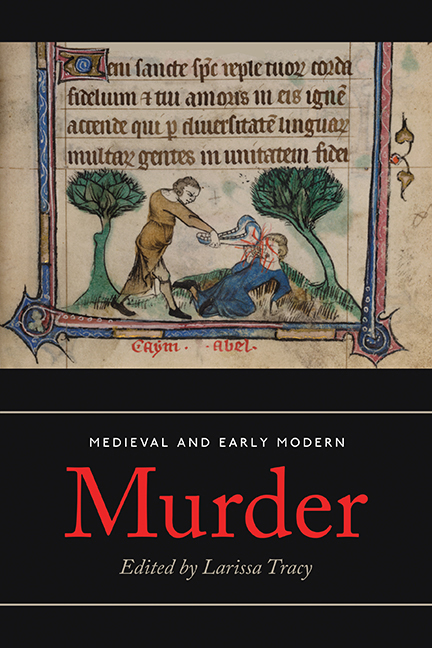Book contents
- Frontmatter
- Contents
- List of Illustrations and Tables
- Acknowledgements
- Contributors
- List of Abbreviations
- Introduction: Murder Most Foul
- I Murder on Trial: Justice, Law and Society
- II The Public Hermeneutics of Murder: Interpretation and Context
- 6 Bringing Murder to Light: Death, Publishing and Performance in Icelandic Sagas
- 7 ‘I Think This Bacon is Wearing Shoes’: Comedy and Murder in the Old French Fabliaux
- 8 ‘Chevaliers ocirre’: Manslaughter, Morality and Meaning in the Queste del Saint Graal
- 9 Murder, Manslaughter and Reputation: Killing in Malory's Le Morte Darthur
- 10 Poisoning as a Means of State Assassination in Early Modern Venice
- 11 Defamation, a Murder More Foul?: The ‘Second Murder’ of Louis, Duke of Orleans (d. 1407) Reconsidered
- 12 ‘A general murther, an universal slaughter’: Strategies of Anti-Jesuit Defamation in Reporting Assassination in the Early Modern Period
- III Murder in the Community: Gender, Youth And Family
- Conclusion
- Select Bibliography
- Index
7 - ‘I Think This Bacon is Wearing Shoes’: Comedy and Murder in the Old French Fabliaux
from II - The Public Hermeneutics of Murder: Interpretation and Context
Published online by Cambridge University Press: 05 July 2018
- Frontmatter
- Contents
- List of Illustrations and Tables
- Acknowledgements
- Contributors
- List of Abbreviations
- Introduction: Murder Most Foul
- I Murder on Trial: Justice, Law and Society
- II The Public Hermeneutics of Murder: Interpretation and Context
- 6 Bringing Murder to Light: Death, Publishing and Performance in Icelandic Sagas
- 7 ‘I Think This Bacon is Wearing Shoes’: Comedy and Murder in the Old French Fabliaux
- 8 ‘Chevaliers ocirre’: Manslaughter, Morality and Meaning in the Queste del Saint Graal
- 9 Murder, Manslaughter and Reputation: Killing in Malory's Le Morte Darthur
- 10 Poisoning as a Means of State Assassination in Early Modern Venice
- 11 Defamation, a Murder More Foul?: The ‘Second Murder’ of Louis, Duke of Orleans (d. 1407) Reconsidered
- 12 ‘A general murther, an universal slaughter’: Strategies of Anti-Jesuit Defamation in Reporting Assassination in the Early Modern Period
- III Murder in the Community: Gender, Youth And Family
- Conclusion
- Select Bibliography
- Index
Summary
IN ONE OF THE THREE VERSIONS of the thirteenth-century Old French comic tale of the sacristan, Le Sacristain II, a servant woman in a tavern opens a bag supposed to contain a side of bacon. Instead, it contains the fully-dressed dead body of a monk. She pulls the corpse out by the boot and struggles to cut the ‘meat’ as she endures heckling from rowdy guests. Fed up, she finally responds: ‘Par seint Leonart,/ Cist bacons est plus dur que hart/ Si est chauciez, ce m'est avis!’ [In the name of Saint Leonard, this bacon is harder than a rope, and I think it is wearing shoes!] (624–7). At first, this might seem like a simple joke about what a fool she is, but the servant's failure to recognise what she is cutting, or to consider that a person might have been murdered, is typical of the characters who encounter dead bodies in the fabliaux. All of the fabliaux that deal with murder involve the violent death of men, primarily priests, most of whom are pursuing married women. Murder is not the main subject, however, but rather the precondition for the humorous adventures of a potentially incriminating corpse. In all of the murder fabliaux, the narrator and the audience share knowledge of the murderous circumstances that created the corpse, but these details are never available to the characters within the story who must dispose of the body. The conspiracy between narrator and audience, when juxtaposed with the antics of those who deal with the dead body, produces a narrative experience that is unique to the murder fabliaux. As corpse comedy combined with social satire, these comic tales play out in their own special moral universe. The world of the murder fabliaux tolerates, and even celebrates, vengeance against adulterous priests, not because they deserve to die, but because successful corpse comedy needs a murdered body that fails to elicit sympathy.
An accusation of murder in thirteenth-century France would have been no laughing matter, as one might expect, so the fervent desire not to get caught with a murdered body would have certainly resonated with any audience, no matter how unlikely such an occurrence might have seemed. If the Coutumes de Beauvaisis (1283) offer an accurate portrait, the accused would have faced punishment by hanging.
- Type
- Chapter
- Information
- Medieval and Early Modern MurderLegal, Literary and Historical Contexts, pp. 159 - 178Publisher: Boydell & BrewerPrint publication year: 2018



